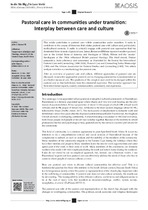Pastoral care in communities under transition: Interplay between care and culture
Abstract
This article contributes to pastoral care within communities under transition. It seeks to
contribute to the corpus of literature that relates pastoral care with culture and, particularly,
multicultural contexts. It seeks to critically engage with pastoral care approaches that has
dominated three strands of pastoral care. James, Boisen and Hiltner represent modern pastoral
care in the United States of America and theologies of Tillich, Hiltner and the ‘secular’
theologians of the 1960s influenced British pastoral theology. The third strand, African
perspective, lacks coherency and consistency as illustrated by the Society for Intercultural
Pastoral Care and Counselling (1988–2008), Pastoral Care and Counselling Today Manuscript
(1991) and The African Association for Pastoral Studies and Counselling (1985). This article
analysis narrative as a methodology for pastoral care.
After an overview of pastoral care and culture, different approaches of pastoral care are
discussed. A narrative approach to pastoral care in changing communities is recommended as
an effective means of care. The positions of the caregiver and cared for is changed within the
pastoral care so that both learns from the existential experience. The narrative approach has
three interrelated aspects, namely communication, community and experience.

